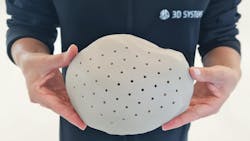Fun Innovations Friday: Skull Sculpting With World's First 3D Cranial Implants
It seems that a lot of our innovations on Fridays have been about advances in the medical sector, and I have another one for you today.
3D Systems, the 3D-printing company, has received 510(k) FDA (the Food and Drug Administration) clearance for its EXT 220 MED printer which uses medical-grade PEEK materials to deliver 3D-printed craniums for cranial reconstruction.
The VSP PEEK Cranial Implant is the first FDA-cleared, additively manufactured PEEK implant intended for cranioplasty procedures to restore defects in the skull. The implant includes a complete FDA-cleared workflow that uses segmentation and 3D modeling software, the 3D Systems EXT 220 MED 3D printer, and Evonik VESTAKEEP i4 3DF PEEK (polyetheretherketone).
The printer provides a self-contained cleanroom environment and a simple post-processing workflow to produce patient-specific medical devices at hospitals with faster turnaround while using up to 85% less material than implants produced by traditional machining, lowering costs. This solution has already been used in nearly 40 cranioplasties across Europe in the past few months including at University Hospital Basel in Switzerland, Salzburg University Hospital in Austria, and Tel-Aviv Sourasky Medical Center in Israel.
The market for cranial reconstruction is anticipated to exceed $2 billion by 2030, making the FDA clearance an important milestone for widespread adoption. The use of 3D printing also allows these applications to be expanded and are more cost-effective when used alongside traditional orthopedic surgeries.
“The solution is revolutionizing the field. The combination of 3D Systems' printing technology that is uniquely engineered for sterile environments along with the mechanical properties of PEEK are helping surgeons push boundaries. Within our hospital, we have already completed several successful surgeries using these technologies. I believe the potential for customized PEEK cranial plates is significant to integrate 3D printing into routine clinical practice," said Dr. Johannes Pöppe, senior attending surgeon, department of neurosurgery, University Hospital Salzburg.
This implant-grade, high-performance polymer has a well-known clinical history in medical device applications due to its performance with mechanical properties that closely mirror human bone. PEEK also has great biocompatibility, is resistant to bodily fluids, and provides stability in a wide range of temperatures. It's also inherently radiolucent, which means that it's transparent for X-rays and has minimal interference in medical imaging, providing a clear evaluation of the surgical site and implant integrity.
"With this FDA clearance, we are now able to bring VSP PEEK Cranial Implant to the U.S.—setting a new standard of excellence for these procedures. We are now looking to the next applications for this technology, which includes 3D-printed spine interbody fusion implants, carbon fiber-reinforced PEEK for plating applications in trauma and fixation, and bioresorbable polymers for large bone and craniomaxillofacial applications." — Dr. Gautam Gupta, SVP & general manager, medical devices, 3D Systems.
3D Systems has been working with surgeons for over 10 years to plan 150,000+ cases and manufacture more than 2 million implants and instruments for 100+ CE-marked and FDA-cleared devices from its FDA-registered, ISO 13485-certified facilities in Littleton, Colorado, and Leuven, Belgium.
With FDA clearance, 3D Systems will be able to expand its PEEK product portfolio through the EXT 220 MED platform and set the stage for a comprehensive range of advanced PEEK-based solutions designed to meet the diverse needs of the medical field.
Fun Innovations Friday
Created by the editors of New Equipment Digest and Plant Services, Fun Innovations Friday is a feel-good blog that showcases how advances in science, math, engineering, and technology are making our world more whimsical. Here’s another post that is guaranteed to brighten your day.
Manufacturing in Space, the Final Frontier
Southwest Research Institute (SwRI) is redefining the future of robotics with its research on in-space servicing, assembly, and manufacturing (ISAM).
About the Author
Laura Davis
Editor-in-Chief, New Equipment Digest
Laura Davis is the editor in chief of New Equipment Digest (NED), a brand part of the Manufacturing Group at EndeavorB2B. NED covers all products, equipment, solutions, and technology related to the broad scope of manufacturing, from mops and buckets to robots and automation. Laura has been a manufacturing product writer for eight years, knowledgeable about the ins and outs of the industry, along with what readers are looking for when wanting to learn about the latest products on the market.
